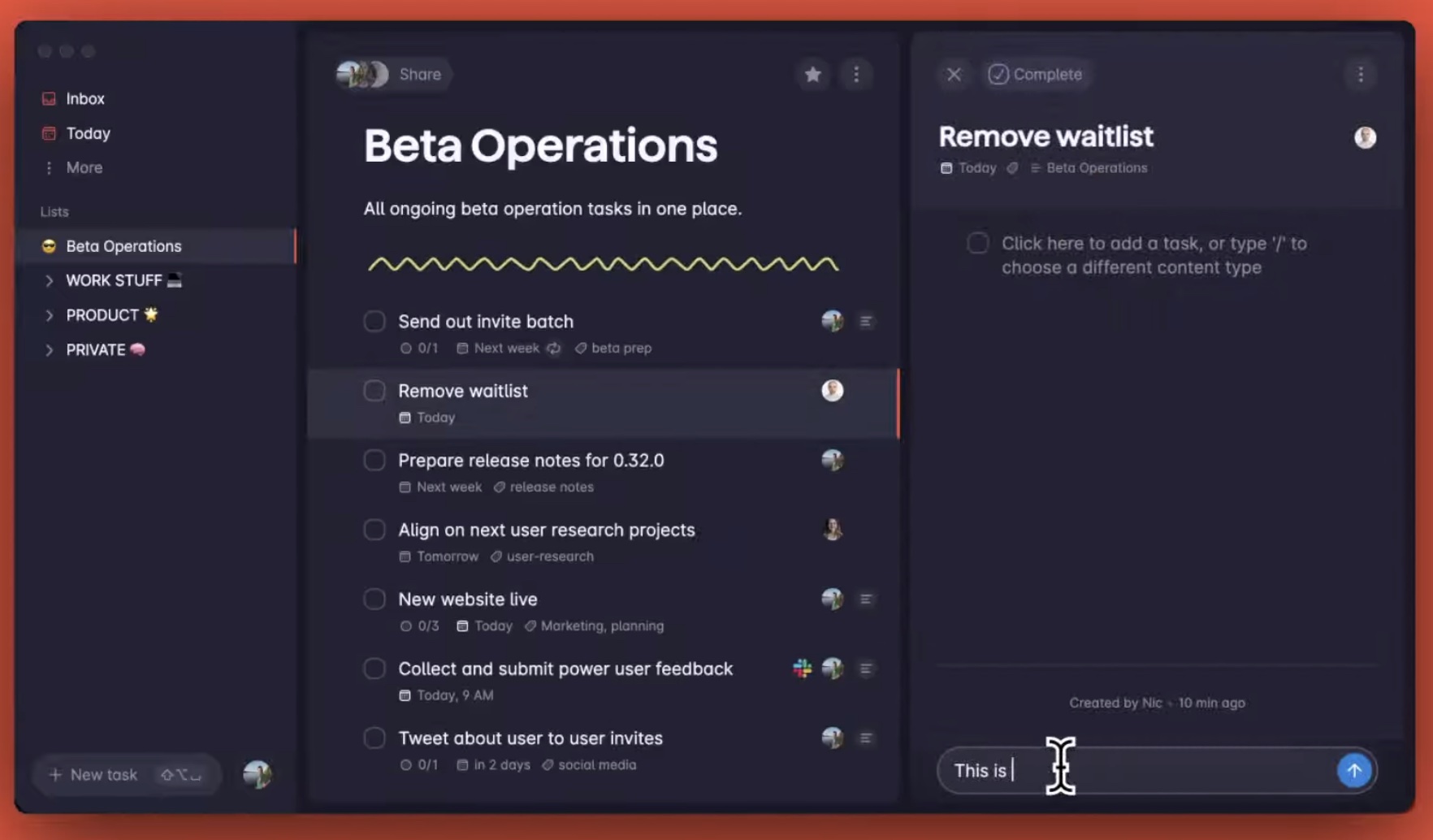The former founder of a to-do lists app which sold for as much as $200 million, comes back, nine years later, with yet another app to do the same thing. Really? It’s a story that would be hard to make up, but it’s happening.
I guess you can’t keep a good founder down. After selling his first startup — to-do lists app Wunderlist — to Microsoft in 2015, Christian Reber (pictured above) could have kicked back with his angel investing (he’s an investor in Notion for instance). Instead, he launched a new company, Pitch, for which he’s now had to find a new CEO. But long ago he also decided his “to-do app” itch still needed scratching.
This week he finally brought Superlist out of beta. It’s a smartphone and desktop app that takes the slick interface approach of the old Wunderlist and brings it into the 21st century.
Now, before we get into why the heck Reber decided to jump back into a startup, let’s cover the basics of the app.
Superlist is a well-rounded to-do list app (it should be, it spent a whole 12 months being beta tested) which, unusually, allows you to split off personal to-do lists and share them with family members, friends or even co-workers (that latter point is key to what comes next). These to dos or tasks can also be enhanced far more deeply than other apps of this type: with long notes, images, you name it, giving it a lot more firepower than similar platforms.
There is also a fairly basic “AI” function that can turn unstructured emails or Slack messages into tasks and their contents with other productivity tools like Gmail, Slack, GitHub and Google Calendar. The minimalistic user interface is simple to use, but the main point to remember is that Superlist is designed for teams. You can make a list for a project, share it with a team and then pack it full of notes, files, tasks, images etc. The Pro account is $8 per month per user, but a free account will actually be enough for most people.
So yes, it’s designed to be personal, but it has an interface that makes it easy to switch between personal and work spaces. Reber says he found when surveying Beta users, that most of them didn’t want to use their company tools “due to privacy concerns or usability issues.” Instead, they are more likely, he says, to bring their personal task list into the work environment, and start using it there. In other words, Superlist has a “Trojan horse” strategy where it will use people’s personal task lists — which also include work lists — to reverse into the enterprise.
As for the company, it has a highly experienced founding team in Reber and Niklas Jansen (founder of Blinkist). To date, the company has raised €13.5 million in funding from Cherry Ventures and EQT.

What is key to all this is that Reber is convinced there is a space between planning apps and to-list apps that Superlist will fill. And you can bet he’s pissed-off that Microsoft turned his baby into a rather boring version of his original vision, and then shut it down. Ironically, Superlist has no integration with Microsoft 365. Perhaps they will have to buy Superlist all over again?
This is an edited conversation with Reber on what he plans to do:
Reber: The full story is that in 2015, we sold, and I personally as a founder and the head of product, I felt I hadn’t actually finished the job. What we wanted to accomplish was a better to-do app that works for individual users, and that scales into teams, basically. We’d wanted to build a product for people to manage their personal as well as their professional projects. Because out there you have tools like Things or Reminders. These are well-crafted tools to organize your personal life, but you can never bring them into the business world because they’re not really meant for sharing and collaboration.
TechCrunch: What about all the planning tools out there?
Reber: In the business world, you have tools like Asana, Monday.com, Basecamp and other pieces of software that are optimized for project managers. But we did a lot of research that showed us 75% of users don’t use those tools. They get bought for the company but people don’t really enjoy using them. When we sold to Microsoft, Microsoft decided to rework the product into the Microsoft stack, but honestly, the product wasn’t for me. I used it. I respect the work, but I didn’t really enjoy it.
There have been other note and task-making tools though. What did you see that was wrong?
Evernote was this individual first productivity app to take notes and write down tasks and put in business cards. And then Notion (I was a seed investor) took this to an entirely new level where you have workspaces. You can add team members, you can collaborate on really simple document types. I absolutely love the company and it grew into a $10 billion juggernaut in the productivity space. And I’m a power user of Notion. I use it in every single project I’m in. But for me, it always felt like, if someone built the successor of Evernote, why is no one building the successor of Wunderlist, like a team-first app? A collaborative to-do app that bridges this gap between personal life and business life?
And I really honestly believe it’s a multibillion-dollar business opportunity. I believe it’s a gigantic market. Every person in in the world is working with lists, organizing their lives personally and professionally. I tried as an angel investor to find the company that excited me but then COVID happened.
Why did it take you three years to build Superlist?
There were hassles like actually figuring out what the fuck is Superlist and how do we solve this problem? And how do we make the product feel nice, unique and not just like a cheap Wunderlist copy. So there was a lot of thinking and a lot of iterations and a little bit of founder clash.
Did you see the opportunity in the fact that we’ve had an explosion of tools for collaborative working, like Slack, Teams, Notion etc?
Apple Reminders is a very personal product. Asana is a very business-oriented product. I don’t personally know why every single company in this space is either working on the consumer space or the business space. But no one is tackling the real problem. What we noticed is that people want flexibility. They also want to add long paragraphs to a quick side note, or they want to add additional headlines or add images into the lists, attachments, PDFs, numbered lists and so on. What we did wrong in the software world was, for instance, Evernote was all about notes. And that’s still the problem. Lists are so much more.
What is going to be the AI aspect?
We’re playing around with a lot of AI features at the moment, like ‘create me a due diligence list for a new company.’ Maybe you could ask Superlist to create a short summary out of something.
How do you see this becoming more than simply a consumer app and something that integrates with other business platforms?
You can be a part of multiple teams. You actually start using this product by yourself, and then later on, you bring your own software into a business. And then you just start organizing your lists at work as well. And then you invite your colleagues to grow the teams that you create. That’s the idea that we have here and that’s, I think, a nice part of the whole experience is that you can just switch off these teams and then your work lists disappear. And if you’re in your work, you can disable your personal list. You don’t have this ladder of switching between a ton of different workspaces.
It reminds me a bit of the Dropbox strategy where people would use it in their personal lives, because it was much easier than trying to use an internal intranet or something.
Right. That’s what we failed at with Wunderlist. We had tens of millions of users. All we accomplished was building a nice interface to manage shopping lists. But we had a couple of users using it at Fortune 500 companies, and none of them paid. None of them really invited their teams because it was too messy. It just didn’t work. And I think that’s the challenge that we’re trying to try to focus on. How can you bridge this. How can you organize your life and work, but not be distracted by either.
Do you see this being picked up on exit by Notion or Slack or Salesforce or somebody else?
Look it always sounds cheesy, but I don’t want to start a company to sell it. I didn’t want it with Wunderlist and I hope we can avoid it with Superlist. I learned the hard way that whenever you write a line of code, it can be overwritten the next day, the next month, or the next year, so nothing lasts forever. I also have to take my co-founder’s vote into the equation, like if they want to have an opportunity where they turn their shares into real money and so on. There are always ways that we can find to solve this. But I don’t want to sell this. I really believe that Superlist can be a decacorn, if we just focus on executing it very, very carefully, we don’t get into a feature war with competitors, and just really focus on our mission.































Comment